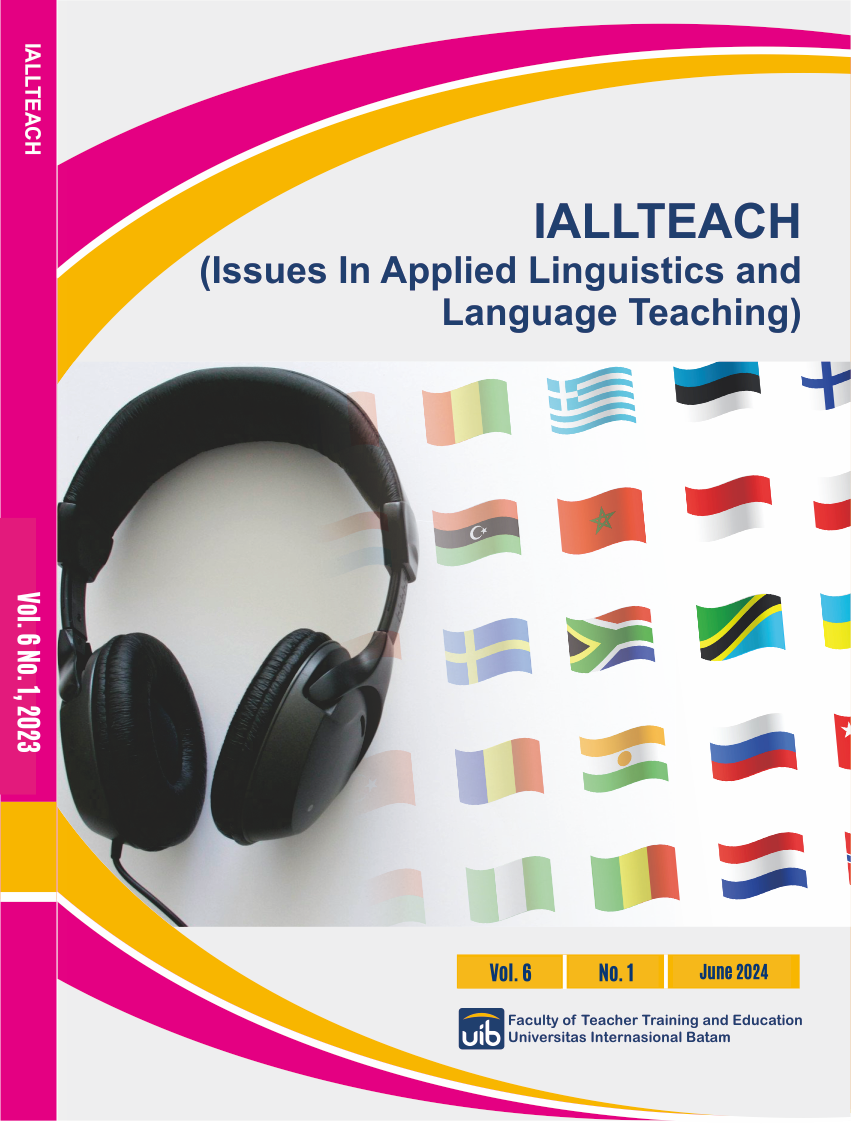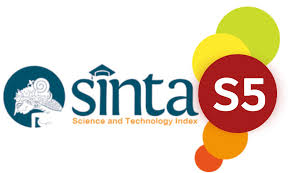Representations of Human Domination in Climate Policy Documents: A Transitivity Analysis
DOI:
https://doi.org/10.37253/iallteach.v6i1.9307Keywords:
Climate governance documents, Climate Resilience Development Policy, Ecolinguistics, Systemic functional linguistics, Transitivity analysisAbstract
This research aims to analyse the transitivity system of Pembangunan Berketahanan Iklim (PBI) documents, one of the key climate governance policy documents in Indonesia, based on an ecolinguistic approach. Using Halliday’s transitivity system (2014), researchers explore clues to the world experience of policymakers in positioning the relationship between humans and their environment through language features in texts. Also employing the same transitivity system, this research applies a mixed-method, integrating both qualitative and quantitative techniques to provide a comprehensive analysis. The authors utilized AntConc 4.2.2. to analyse the corpus of 46,789 tokens. Concordances containing keywords: lingkungan, alam, habitat, ekosistem, and hayati were analyzed using the transitivity system framework to identify the distribution of process types and participant roles within the corpus. Research findings show a significant prevalence of material processes, indicating a focus on actions and events. Furthermore, the analysis shows the patterns of the active roles of human participants, actor obscuring, as well as environmental keywords that fill the role of passive participants and circumstantial phrases that clarify the tradition of human domination over the environment. These transitivity patterns indicate stylistic features of an ambivalent discourse that perpetuates human domination over the environment. From the perspective of Living! ecosophy (Stibbe, 2021), language patterns that still represent anthropocentric perspectives are incompatible with sustainable ecological discourse. This research of transitivity analysis enriches the study of climate governance discourse in policy documents in the Indonesian context.
Downloads
References
Acha, W. A. (2022). An Ecocritical Discourse Analysis of Anthropocentrism in the Cameroonian Press. International Journal of Humanity Studies (IJHS), 5(2), 120–140. https://doi.org/10.24071/ijhs.v5i2.4202
Afidah, R. L. N., Suyitno, S., & Suhita, R. (2022). Ecological Balance in the Metaphor of the Novel-Partikel by Dewi Lestari (Eco-linguistic Study). International Journal of English Literature and Social Sciences, 7(1), 15–18. https://doi.org/10.22161/ijels.71.4
Ali, J. H. M. (2019). Ecolinguistics and Systemic Functional Linguistics (SFL): Transitivity in ‘Climate Change in Egypt’ by Ali Masria. Beni-Suef University International Journal of Humanities and Social Sciences, 1(1), 9–38. https://doi.org/10.21608/buijhs.2019.91308
Al-Maashani, F. (2023). A Corpus-based Analysis of King Charles’s Inaugural Speech from the Perspective of Transitivity. Canadian Journal of Language and Literature Studies, 3(4), 17–30. https://doi.org/10.53103/cjlls.v3i4.102
Almaghlouth, S. (2022). Deconstructing Agency in the G20 Leaders’ Declarations in the Last Decade: A Corpus-assisted Discourse Study. Heliyon, 8(12), 1–12. https://doi.org/10.1016/j.heliyon.2022.e12439
Alraimi, L. M., & Abdalla, A. Y. (2019). Realization of Authorial Ideations & Purposes through Transitivity Analysis of Media Texts Written by Native and Non-Native Writers of English: A SFG Perspective. Arab World English Journal, 10(1), 190–208. https://dx.doi.org/10.24093/awej/vol10no1.17
Chawla, S. (2001). Linguistic and Philosophical Roots of Our Environmental Crisis. In A. Fill & P. Muhlhausler (Eds.), Ecolinguistics Reader: Language, Ecology and Environment (pp. 109–114). Continuum.
Cheng, M. (2022). Theoretical Framework for Ecological Discourse Analysis: A Summary of New Developments of Ecological Discourse Analysis. Journal of World Languages, 8(1), 188–226. https://doi.org/10.1515/jwl-2021-0030
Creswell, J. (2009). Research Design. Sage Publication Inc.
Creswell, J. W., & Clark, V. L. P. (2011). Designing and Conducting Mixed Methods Research. SAGE Publications.
Eggins, S. (2004). An Introduction to Systemic Functional Linguistics (2nd ed.). Continuum International Publishing Group.
Fairclough, N. (2003). Analysing Discourse: Textual Analysis for Social Research. Routledge.
Fan, N. (2023). An Ecological Discourse Analysis of Faulkner’s The Bear from the Perspective of Transitivity System. Academic Journal of Humanities & Social Sciences, 6(2), 48–52. https://doi.org/10.25236/AJHSS.2023.060209
Furnaz, R. (2023). Transitivity Analysis of the Sustainable Development Goals (SDGs) of United Nations (UN). UCP Journal of Languages & Literature, 1(1), 43–73. http://58.27.199.232/index.php/ucpjll/article/view/210
Ginting, P., Algae, G., Hasnah, Y., Saragih, M., & Kharisma, A. (2024). The Embodiment of Environmental Discourse in Language Learning: A Critical Ecolinguistic Study of EFL Textbooks in Indonesia. جستارهای زبانی, 15(1), 145–175. https://doi.org/10.29252/LRR.15.1.6
Goatly, A. (2000). Critical Reading and Writing: An Introductory Coursebook. Routledge.
Gupta, J. (2010). A History of International Climate Change Policy. WIREs Climate Change, 1(5), 636–653. https://doi.org/10.1002/wcc.67
Gwilliams, L., & Fontaine, L. (2015). Indeterminacy in Process Type Classification. Functional Linguistics, 2(1), 1–19. https://doi.org/10.1186/s40554-015-0021-x
Hadi, W., & Mulyono, M. (2023). EcoLinguistic Insights in Nias Village Name: Unravelling the Dynamic Bond Between Language and Environment. REiLA : Journal of Research and Innovation in Language, 5(3), 216–233. https://doi.org/10.31849/reila.v5i3.13552
Halliday, M. A. K., & Martin, J. R. (1993). Writing Science: Literacy and Discursive Power. The Falmer Press.
Halliday, M. A. K., & Matthiessen, C. M. I. M. (2014). Halliday’s Introduction to Functional Grammar (4th ed.). Routledge.
Hartnett, C. G. (1998). English Nominalization Paradoxes (pp. 1–20). Arizona State University. https://eric.ed.gov/?id=ED426411
Indratmo, A., Sundari, S., & Adi, P. (2020, June 18). Javanese Traditional Community of Natural Preservation in the Central Java Stories. The International Seminar on Recent Language, Literature, and Local Culture Studies “Kajian Mutakhir Bahasa, Sastra, Dan Budaya Daerah (BASA)”. http://dx.doi.org/10.4108/eai.20-9-2019.2296870
Kementerian PPN/Bappenas. (2021a). Daftar Lokasi & Aksi Ketahanan Iklim. Kementerian Perencanaan Pembangunan Nasional/Badan Perencanaan Pembangunan Nasional. https://lcdi-indonesia.id/dokumenpublikasipembangunanberketahananiklim/
Kementerian PPN/Bappenas. (2021b). Kelembagaan untuk Ketahanan Iklim. Kementerian Perencanaan Pembangunan Nasional/Badan Perencanaan Pembangunan Nasional. https://lcdi-indonesia.id/dokumenpublikasipembangunanberketahananiklim/
Kementerian PPN/Bappenas. (2021c). Pemantauan, Evaluasi, & Pelaporan Aksi Ketahanan Iklim dalam Kerangka Perencanaan Pembangunan Nasional. Kementerian Perencanaan Pembangunan Nasional/Badan Perencanaan Pembangunan Nasional. https://lcdi-indonesia.id/dokumenpublikasipembangunanberketahananiklim/
Kementerian PPN/Bappenas. (2021d). Pendanaan Ketahanan Iklim. Kementerian Perencanaan Pembangunan Nasional/Badan Perencanaan Pembangunan Nasional. https://lcdi-indonesia.id/dokumenpublikasipembangunanberketahananiklim/
Kementerian PPN/Bappenas. (2021e). Peran Lembaga Non-Pemerintah dalam Ketahanan Iklim. Kementerian Perencanaan Pembangunan Nasional/Badan Perencanaan Pembangunan Nasional. https://lcdi-indonesia.id/dokumenpublikasipembangunanberketahananiklim/
Kementerian PPN/Bappenas. (2021f). Ringkasan Eksekutif Kebijakan Pembangunan Berketahanan Iklim (Climate Resilience Development Policy) 2020-2045. Kementerian Perencanaan Pembangunan Nasional/Badan Perencanaan Pembangunan Nasional. https://lcdi-indonesia.id/dokumenpublikasipembangunanberketahananiklim/
Knight, C. (2010). The Discourse of “Encultured Nature” in Japan: The Concept of Satoyama and Its Role in 21st-Century Nature Conservation. Asian Studies Review, 34(4), 421–441. https://doi.org/10.1080/10357823.2010.527920
Mansyur, S. A. (2021). Representasi Isu Perubahan Iklim dalam Pidato Aktivis Remaja: Analisis Wacana Eko-Kritis [Masters, Universitas Pendidikan Indonesia]. http://repository.upi.edu
Mansyur, S. A., Gunawan, W., & Isnendes, R. (2022). Human Representation on Environmental Speech in Terms of Transitivity Process. SAGA: Journal of English Language Teaching and Applied Linguistics, 3(1), 27–40. https://doi.org/10.21460/saga.2022.31.117
Mansyur, S. A., Lukmana, I., Isnendes, R., & Gunawan, W. (2021). Eco-critical Discourse Analysis of the Indonesian President’s Statement at the 21st Conference of the Parties in Paris. REiLA: Journal of Research and Innovation in Language, 3(2), 105–114. https://doi.org/10.31849/reila.v3i2.6285
Martin, J. R. (1992). English Text: System and Structure. In Z.59. John Benjamins Publishing Company.
Martin, J. R., Matthiessen, C. M. I. M., & Painter, C. (2010). Deploying Functional Grammar. The Commercial Press.
Milstein, T. (2009). “Somethin’ Tells Me It’s All Happening at the Zoo”: Discourse, Power, and Conservationism. Environmental Communication, 3(1), 25–48. https://doi.org/10.1080/17524030802674174
Mohammed, T. A. S. (2023). From Eco-Jihad to Politicization: A Corpus-based Eco-linguistic Discourse Analysis of the Arab Media Coverage of the Safer Floating Oil Tanker. World Journal of English Language, 13(2), 127–140. https://doi.org/10.5430/wjel.v13n2p127
Mushtaq, M., Saleem, T., Afzal, S., & Saleem, A. (2021). A Corpus-based Ideational Meta-Functional Analysis of Pakistan Prime Minister Imran Khan’s Speech at United Nations General Assembly. Cogent Social Sciences, 7(1), 1–17. https://doi.org/10.1080/23311886.2020.1856999
Oreskes, N. (2004). The Scientific Consensus on Climate Change. Science, 306(5702), 1686–1686. https://doi.org/10.1126/science.1103618
Oreskes, N., Conway, E., Karoly, D. J., Gergis, J., Neu, U., & Pfister, C. (2018). The Denial of Global Warming. In S. White, C. Pfister, & F. Mauelshagen (Eds.), The Palgrave Handbook of Climate History (pp. 149–171). Palgrave Macmillan UK. https://doi.org/10.1057/978-1-137-43020-5_14
Poole, R. (2016). A Corpus-Aided Ecological Discourse Analysis of the Rosemont Copper Mine Debate of Arizona, USA. Discourse & Communication, 10(6), 576–595. https://doi.org/10.1177/1750481316674775
Republik Indonesia. (2020). Peraturan Presiden No. 18 Tahun 2020 tentang Rencana Pembangunan Jangka Menengah Nasional Tahun 2020-2024. https://jdih.bappenas.go.id/peraturan/detailperaturan/1037
Riyandi, S. W. (2022). Visual and Verbal Means to Attract Our Clicks: Multimodality in YouTube Thumbnails. NOTION: Journal of Linguistics, Literature, and Culture, 4(1), 54–62. https://doi.org/10.12928/notion.v4i1.5773
Stibbe, A. (2021). Ekolinguistik: Bahasa, Ekologi, dan Cerita-Cerita yang Kita Jalani (Y. Syufi & H. Warami, Trans.; I). Pustaka Pelajar.
Suhandano, S., Isti’anah, A., & Febrina, R. (2023). Contesting ‘Growth’ and ‘Sustainability’ in Indonesia’s Capital city Relocation: A Corpus Ecolinguistic Study. Theoretical and Applied Linguistics, 9(3), 65–83. https://doi.org/10.18413/2313-8912-2023-9-3-0-5
Wang, G., & Huan, C. (2023). Negotiating Climate Change in Public Discourse: Insights from Critical Discourse Studies. Critical Discourse Studies, 0(0), 1–13. https://doi.org/10.1080/17405904.2023.2198725
White, S., Pfister, C., & Mauelshagen, F. (Eds.). (2018). The Palgrave Handbook of Climate History. Palgrave Macmillan UK.
Wijana, I. D. P. (2019). Pengantar Semantik Bahasa Indonesia (3rd ed.). Program Studi Linguistik UGM dan Pustaka Pelajar.
Wiratno, T. (2018). Pengantar Ringkas Linguistik Sistemik Fungsional. Pustaka Pelajar.
Yuniawan, T., Rokhman, F., Rustono, & Mardikantoro, H. B. (2023). An Ecolinguistic Analysis of Conservation News Published by Mass Media in Indonesia. Cogent Arts & Humanities, 10(1), 1–15. https://doi.org/10.1080/23311983.2023.2174519
Zheng, X. (2021). Transitivity Structure of Research Articles: Variations across Sections. English Language Teaching, 14(8), 8–18. https://doi.org/10.5539/elt.v14n8p8
Zuo, X. (2019). An Ecological Discourse Analysis of the Report of the 19th National Congress of the Communist Party of China. Theory and Practice in Language Studies, 9(9), 1191–1197. https://doi.org/10.17507/tpls.0909.16




.png)






